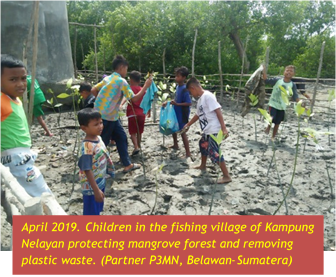Why plastic waste?
“Start by doing what’s necessary; then do what’s possible; and suddenly you are doing the impossible” . Terre des homes Germany launched and is strengthening – and as we speak expanding – its Environmental Child Rights action with its Indonesia partners this year.

In 2018 terre des hommes and partners identified the issue of plastic waste.
As Leo Marbun from P3MN said: “Often the fisher folks tell us that they catch more plastic than fish”.
This simple statement reveals the huge problem Indonesia has in coping with is waste, in particular plastic waste. Considering Indonesia is home to nearly 270 million people, one can imagine that the amount of daily waste is huge and therefore the nation requires a well- developed waste management infrastructure.
Many are responsible and have a role to play to answer this threat, but all are set to gain the benefits of a clean and healthy environment.
For terre des hommes Germany and partners its child right program in Southeast Asia is striving to contribute to our projects and communities. The young ones’ own responsibility and energy that will be the obvious strength to change behavior and practices and lead to a long-term solution of ending plastics pollute the oceans.
Much too often we witness Indonesians of all walks of life, old and young, throwing away trash on the streets or use the river and streams as trash bins. If anything this indicates that, generally, there is a huge lack of environmental awareness in Indonesia.
Problematically, a large portion of the garbage that is thrown away on Indonesia’s streets, rivers or other places is not biodegradable, meaning it cannot break down into natural materials in the environment without causing harm. Many materials, particularly plastic or cigarette butts, break down in a much more harmful manner, leaving behind chemicals or other harmful substances in the soil or water.
Read the rest of the newsletter here.
